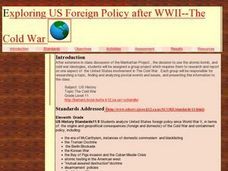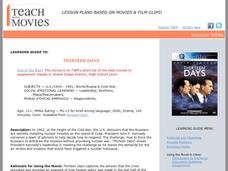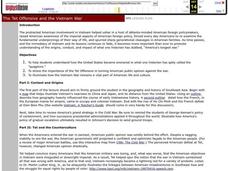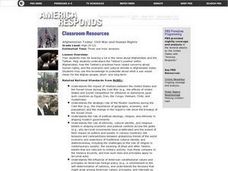Curated OER
Cold War Conflict in Vietnam: The Vietnam-Era Presidency
Comparing and evaluating various media types is a great way to build critical analysis skills. Learners read about the Vietnam era presidency, specifically the foreign policy established by Johnson and Nixon. Then they compare several...
Curated OER
Decoding US Foreign Policy: The Iran-Contra Affair
This is a really good lesson. Learners explore US Foreign Policy, the Reagan Administration, and the Iran-Contra Affair through various documents and readers theater. Worksheets, script, and web links are all included. Teaching can't get...
PBS
President Theodore Roosevelt: Foreign Policy Statesman or Bully?
Can a negative perception of a president's foreign policy harm his or her historical legacy? A project that winds the clock back to the date of Theodore Roosevelt's death puts students at the editorial desk of a fictional newspaper....
Curated OER
1960 America: Foreign Policy
The 1960's marked shifts in American culture, politics, and policy. Your class groups up to research a series of primary source documents resulting in a timeline and a 15 minute oral presentation. Active learning all the way.
Curated OER
Exploring US Foreign Policy after WWII--The Cold War
Scholars explore U.S. Foreign Policy and Cold War ideologies adopted after WWII. They conduct Internet research on a topic or issue related to the Cold War Era, watch two films, and compose a time line and a multimedia presentation to...
Roy Rosenzweig Center for History and New Media
End of the Cold War
How significant was the Cold War during the 20th century? After reading and analyzing speeches by Ronald Reagan and Mikhail Gorbachev, learners consider the historical context of foreign policy decisions made during the Cold War by both...
Curated OER
"Police Action": The Korean War, 1950-1953
Students investigate facts about the war in Korea in the 1950's and attempt to classify American foreign policy as a triumph or a failure. Why the U.S. became involved and the unpopularity of the war in America forms the focus of this...
Curated OER
Cold War
Eleventh graders analyze U.S. foreign policy since World War II, tracing origins and geopolitical consequences (foreign and domestic) of the Cold War and containment policy.
Center for History Education
Guatemalan Coup of 1954: How Did the Cold War Influence American Foreign Policy Decisions?
Was it all about the bananas—or the fear of a communist threat? Young historians use a history lab to examine documents from the American-led 1954 Guatemalan coup. Using graphics, government documents, and speeches, they examine the...
Center for History Education
U.S. Foreign Policy and the Iran-Contra Affair: Was Oliver North a Patriot, a Pawn, or an Outlaw?
If you had to write a song about Oliver North, would it be a ballad or a dirge? If you had to put him on a trading card, would he be a hero or the bad guy? Young historians decide for themselves after examining documents from the...
Teach with Movies
Learning Guide to Thirteen Days
While Thirteen Days is a fantastic film to use in the classroom in reference to the Cold War and the Cuban missile crisis, it is important to take care to effectively and properly incorporate its contents into your curriculum. This...
Curated OER
Foreign Policy: Containment
Young scholars examine opinions regarding the American policy of containment. In this Cold War lesson, students read articles by George F. Kennan and Walter Lippmann. Young scholars compare the perspectives of the 2 men on U.S. foreign...
Curated OER
US Government: Foreign Policy (Part 1)
Students explore foreign policy. In this foreign policy lesson, students define terms regarding foreign policy. Students respond to questions regarding textbook readings and a lecture regarding U.S. foreign policy.
Curated OER
Sources of the Cold War
Fourth graders make a time line from their notes and outlines of the causes of the Cold War.
Curated OER
Coup to Revolution: U.S. foreign Policy in Iran
Students read and discuss the Iran country Profile from the CIA World Factbook. They describe the current relationship between the United States and Iran. Students complete additional readings, and answer questions about them. They...
Curated OER
The Cold War and Development of Post-War America
Students view examples of political advertisements during the years of 1952 through 1964. After viewing, they discuss how the Cold War and the threat of Communism affected the development of the United States. They compare the Cold War...
Curated OER
American Foreign Policy Since World War II (The Cold War)
Students identify and interpret some key figures and major events during the Cold War era, including the Korean War, Vietnam, Cuban Missile Crisis, Bay of Pigs Invasion, and the United States and China Cold War Relations. They also play...
Foreign Policy Research Institute
Categories of Cold War Histiography
While the objective is to provide an overview of the Cold War in preparation for further study, this resource addresses the topic at a rather advanced level, and might need its own introductory lesson. The handouts include terms such as...
University of California
Containing Communism Abroad
Learn more about the policy of the United States to contain communism during the Cold War. The fifth installment of an eight-part series looks at primary and secondary materials about a challenging time in history. After analyzing the...
Curated OER
The Tet Offensive and the Vietnam War
Learners discover how the United States became involved in the Vietnam War, the importance of the Tet Offensive in turning American public opinion against the war, and how the Vietnam War is still a part of American life and culture.
John F. Kennedy Presidential Library & Museum
Military Advisers in Vietnam: 1963
How did the beginning of the Vietnam War factor into the Cold War with the Soviet Union? As part of a study of American involvement in Vietnam, class members read a letter address to President Kennedy and his response in which he...
Curated OER
Afghanistan Today: Civil War and Human Rights
Students examine the relationship between the United States and the Soviet Union during the Cold War. They analyze the role of religion and cultural identity in shaping governments. They also examine the United States foreign policy.
University of California
Anti-Communism at Home
Have you ever been accused of something without cause? The sixth installment of an eight-part series asks scholars to create a museum exhibit on the anti-communist activities in the United States at the start of the Cold War. To make...
Curated OER
The Cold War Warrior Defending: The Moral Beacon of the World
Students identify President Reagan's domestic and foreign policy, describe America's attitude toward communism, list characteristics which endeared Reagan to the American people, and explain why some Americans spoke out against Reagan's...

























